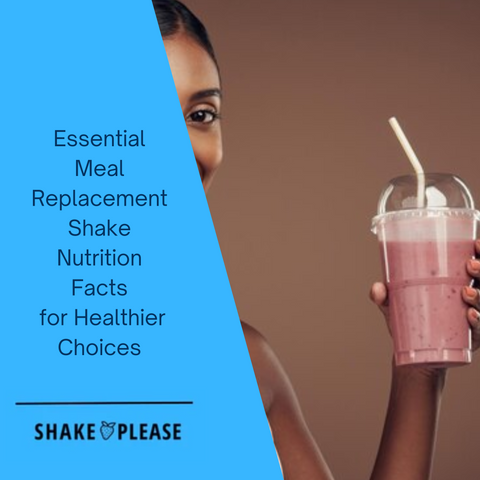
What is a Meal Replacement Shake?
A meal replacement shake is a convenient and portable drink that provides a balanced blend of protein, carbohydrates, and fiber, designed to support overall health and well-being. These shakes are formulated to replace a full meal by offering essential nutrients, making them a popular choice for individuals with busy schedules or specific dietary restrictions.
Meal replacement shakes serve as a supplement to help maintain or improve nutrition, support weight management, and promote muscle growth. They offer a quick, nutritious alternative to traditional meals, ensuring that you get the necessary nutrients even when you’re short on time or unable to prepare a full meal.
Benefits of Meal Replacement Shakes
Meal replacement shakes are packed with benefits that make them a convenient and effective option for those with busy lives or specific nutritional goals. Here’s a breakdown of the top advantages:
-
Convenient and Portable
Meal replacement shakes are incredibly easy to take on-the-go, making them a great option for those with hectic schedules. Whether you’re headed to work, the gym, or traveling, you can quickly consume a balanced meal without the need for preparation or cleanup. -
Supports Weight Management and Muscle Growth
These shakes can help control calorie intake and manage hunger, which is beneficial for weight management. For those looking to gain muscle, the protein content in meal replacement shakes aids in muscle recovery and growth. -
Provides a Balanced Mix of Nutrients
A good meal replacement shake includes a balance of essential nutrients:-
Protein to support muscle repair and growth
-
Carbohydrates for sustained energy
-
Fiber to promote fullness and digestive health
This balanced combination helps maintain overall health and well-being.
-
-
Ideal for Busy Lifestyles or Dietary Restrictions
Meal replacement shakes are especially beneficial for those with busy lives, dietary restrictions (such as gluten-free, vegan, or lactose intolerant), or anyone who struggles to prepare healthy meals regularly. -
Can Be Used as a Supplement to Support Overall Health
Whether you're looking to supplement your diet, manage your weight, or maintain healthy habits, meal replacement shakes provide a quick and nutritious way to ensure you're getting a sufficient intake of essential nutrients.
Nutritional Content of Meal Replacement Shakes
Meal replacement shakes are designed to deliver key nutrients in a single serving. Here’s a look at what to expect from their nutritional content:
-
Calories: Typically contains 200-210 calories per serving, making it an appropriate option for those looking to control their calorie intake, whether for weight loss or maintenance.
-
Protein: Each serving provides around 24 grams of easy-to-digest protein, which is essential for muscle growth, repair, and helping with weight management by promoting fullness and reducing hunger.
-
Vitamins and Minerals:
-
A variety of vitamins and minerals are included to support overall health. Common nutrients include:
-
Potassium citrate (for heart health and fluid balance)
-
Magnesium phosphate (supports muscle and nerve function)
-
Calcium carbonate (important for bone health)
-
-
Additionally, some shakes may contain a mineral blend that includes:
-
Manganese sulfate (supports metabolism and antioxidant function)
-
Potassium iodide (supports thyroid function)
-
Sodium molybdate (helps with enzyme function and overall metabolic processes).
-
-
This combination of nutrients helps ensure that meal replacement shakes provide more than just a quick meal — they contribute to a balanced and health-conscious diet.
The Truth: Are Meal Replacement Shakes Healthy?
Importance of Protein in Meal Replacement Shakes
Protein plays a crucial role in supporting the body’s function and is one of the primary nutrients in meal replacement shakes. Here’s why protein is so important:
-
Muscle Growth and Repair
Protein is the building block of muscles, and consuming an adequate amount supports muscle growth and recovery. This is particularly important for athletes, bodybuilders, or anyone engaging in regular physical activity. Protein helps repair muscle fibers that are broken down during exercise, leading to stronger, leaner muscles over time. -
Weight Management and Sustained Energy
Protein is also beneficial for weight management. It helps increase feelings of fullness and satiety, which can reduce overall calorie intake. Protein also provides a steady source of energy, preventing the blood sugar spikes and crashes that can occur with higher-carb meals, thus promoting sustained energy levels throughout the day. -
Overall Health and Well-being
Protein supports various functions in the body beyond muscle maintenance, such as immune function, enzyme production, and hormone regulation. Ensuring sufficient protein intake is essential for maintaining a healthy body and supporting long-term wellness. -
Protein Sources in Meal Replacement Shakes
Meal replacement shakes often contain a variety of protein sources to meet dietary needs, including:-
Milk Protein Concentrate: A complete protein containing all essential amino acids.
-
Soy Protein Isolate: A plant-based protein that provides a complete amino acid profile, ideal for those who prefer vegan options.
-
Pea Protein: Another plant-based protein, rich in essential amino acids, especially suitable for those with dairy or soy sensitivities.
-
Sugar Content and Artificial Ingredients in Meal Replacement Shakes
While meal replacement shakes offer convenience and balanced nutrition, it’s essential to be mindful of the ingredients they contain, particularly sugar and artificial additives.
-
High Sugar Content
Some meal replacement shakes contain added sugars to enhance flavor, but excessive sugar can lead to blood sugar spikes, increased fat storage, and other health concerns. Consuming shakes with high sugar content can counteract the benefits of using a meal replacement for weight management or muscle growth. -
Artificial Ingredients
Many meal replacement shakes on the market contain artificial ingredients, such as:-
Artificial Flavors: These are added to improve taste but offer no nutritional value and may negatively impact health over time.
-
Citric Acid: Often used to enhance flavor and preserve freshness, but some may find it irritating or harsh on the digestive system.
-
Sodium Molybdate: This mineral is sometimes added to shakes, but it's important to be aware of excessive intake. While it’s generally safe in small amounts, it’s essential to look for natural sources of nutrients.
-
-
Choosing Wholesome Ingredients
When selecting a meal replacement shake, prioritize those that use natural sweeteners (such as stevia or monk fruit) and have minimal artificial ingredients. Look for shakes with whole food ingredients, as they are more likely to support overall health without introducing harmful additives. Shakes made with organic, plant-based proteins or high-quality whey protein can offer better nutritional benefits and are less likely to contain unwanted additives.
Choosing shakes with natural ingredients can help ensure that you’re fueling your body with the best possible nutrition for your goals, whether that’s weight management, muscle growth, or overall health.
Organic and Non-GMO Meal Replacement Shakes
For those who prioritize the quality of their ingredients, organic and non-GMO meal replacement shakes offer an excellent choice. Here’s why you should consider these options:
-
Higher-Quality Ingredients
Organic meal replacement shakes are made from ingredients that are grown without synthetic pesticides, fertilizers, or genetically modified organisms (GMOs). This ensures that the shakes you consume are free from potentially harmful chemicals or genetic modifications. Non-GMO shakes, while not necessarily organic, ensure that the ingredients haven’t been genetically altered, which is important for those who wish to avoid genetically engineered food. -
Certifications to Look For
To ensure the authenticity and quality of the product, look for certifications like USDA Organic or Non-GMO Project Verified. These certifications guarantee that the product has met strict standards for organic farming practices and non-GMO status, respectively. They also ensure that the product is free from harmful additives and contaminants. -
Peace of Mind with Clean Ingredients
Choosing organic and non-GMO options offers peace of mind, especially for individuals who are concerned about the long-term effects of synthetic chemicals, GMOs, and other artificial ingredients. These options typically contain more nutrient-dense ingredients, contributing to better overall health. -
Higher Cost, But Worth It for Some
Organic and non-GMO meal replacement shakes may be more expensive than conventional options. However, many people find the extra cost worth it for the assurance that they are consuming cleaner, higher-quality products that align with their values and health goals.
Choosing the Right Meal Replacement Shake
When selecting soy ingredients for a meal replacement shake, it’s important to consider several factors to ensure that the shake you choose aligns with your dietary needs, health goals, and lifestyle. Here are some tips for making an informed choice:
-
Consider Your Dietary Needs and Restrictions
Every individual has unique dietary needs, so choose a shake that aligns with your specific requirements. For example:-
If you’re lactose intolerant, opt for plant-based protein shakes (such as pea or soy protein).
-
If you follow a vegan diet, make sure the shake is entirely plant-based and free from animal-derived ingredients.
-
If you’re on a gluten-free diet, look for shakes labeled as gluten-free.
-
-
Wholesome Ingredients with Minimal Artificial Additives
Look for shakes that focus on natural, whole-food ingredients. Avoid shakes with a long list of artificial ingredients, such as artificial sweeteners, flavors, or preservatives. The simpler and more natural the ingredients, the better it is for your health. -
Aligning with Your Health and Wellness Goals
Whether you're looking to lose weight, build muscle, or just maintain a healthy diet, make sure that the shake supports your specific goals. For example, if you want to lose weight, choose a lower-calorie shake with higher fiber content to help control hunger. If muscle growth is your goal, opt for shakes with a higher protein content. -
Consult with a Healthcare Professional
If you have specific nutritional needs, health concerns, or medical conditions, it’s always a good idea to consult with a healthcare professional before adding meal replacement shakes to your routine. A registered dietitian or nutritionist can provide personalized recommendations to help you choose the best option for your needs.
By keeping these considerations in mind, you can select a meal replacement shake that best supports your overall health, dietary preferences, and wellness goals.
Meal Replacement Shake Recipes
Meal replacement shakes are not just convenient and nutritious—they can also be customized to suit your taste preferences and dietary goals. Here are a few ways to experiment with different flavors and ingredients to create delicious shake recipes:
-
Add Fruits, Nuts, and Seeds for Extra Flavor and Nutrition
Enhance the taste and nutritional value of your meal replacement shakes by adding fruits, nuts, or seeds. Fruits like strawberries, bananas, and blueberries provide natural sweetness, while nuts and seeds like almonds, chia, or flaxseeds add healthy fats, protein, and fiber.For example, you could add a scoop of peanut butter or a handful of berries to a basic vanilla shake to boost its flavor profile and nutrient density.
-
Use Meal Replacement Shakes as a Base for Smoothies
Meal replacement shakes can serve as a fantastic base for smoothies. Add your favorite fruit, leafy greens like spinach or kale, or even a scoop of protein powder for an extra protein boost. Mix in some almond milk, coconut water, or Greek yogurt for a creamy texture.Here are some delicious options to consider:
-
Strawberry Banana Protein Smoothie: A classic, creamy smoothie with the perfect balance of fruity flavors. Try it here: Strawberry Banana Protein Smoothie
-
Chocolate Peanut Butter Banana Protein Smoothie: A rich and indulgent treat with protein-packed goodness. Grab it here: Chocolate Peanut Butter Banana Protein Smoothie
-
Vanilla Berry Protein Smoothie: A sweet and refreshing smoothie with a smooth vanilla taste. Check it out here: Vanilla Berry Protein Smoothie
-
Pineapple Berry Protein Smoothie: A tropical and vibrant smoothie that’s both refreshing and filling. Get it here: Pineapple Berry Protein Smoothie
-
-
Get Creative and Have Fun with Recipes
Don’t be afraid to try new ingredients and combinations. Add spices like cinnamon, turmeric, or cocoa powder for an extra flavor kick. You can even blend in some oats or avocado to make your shakes more filling and creamy.
Delicious Quick Smoothie Recipe for a Refreshing Start to Your Day
Common Mistakes to Avoid When Using Meal Replacement Shakes
-
Not Reading Labels Carefully
Always read the ingredients and nutritional information on the labels. This ensures that you're avoiding unwanted ingredients, allergens, or artificial additives. Some meal replacement shakes may contain excess sugar or preservatives, which can undermine the health benefits you're looking for. -
Not Considering Your Individual Nutritional Needs and Restrictions
Everyone has different nutritional needs, so it's important to choose a shake that aligns with your specific goals and restrictions. For example, if you're following a keto diet, choose a low-carb shake. If you have allergies or intolerances, look for shakes that are free from dairy, gluten, or soy. -
Relying Too Heavily on Meal Replacement Shakes
While meal replacement shakes are convenient, they should not be relied upon as your sole source of nutrition. It’s important to maintain a balanced diet that includes whole foods like fruits, vegetables, lean proteins, and healthy fats for optimal health and well-being. -
Not Consulting with a Healthcare Professional
If you have specific dietary concerns or health conditions, it’s always a good idea to consult with a healthcare professional before making meal replacement shakes a regular part of your diet. A registered dietitian can help you select the best products and guide you on how to incorporate them into your diet effectively.
By experimenting with recipes, paying attention to labels, and considering your personal health needs, you can make the most of meal replacement shakes and integrate them into a balanced, healthy lifestyle.
Safety and Side Effects of Meal Replacement Shakes
Meal replacement shakes are generally safe for most individuals when used as directed. However, as with any supplement or dietary change, there are a few important considerations to ensure their safe use:
-
Potential Side Effects
Some individuals may experience mild digestive issues or allergic reactions to certain ingredients, especially if they have sensitivities to common components like soy, dairy, or gluten. Be cautious of ingredients such as:-
Soy lecithin: A common emulsifier used in shakes, which may cause digestive discomfort for those with soy allergies.
-
Potassium chloride: Sometimes added to shakes for electrolyte balance. Excessive intake could be harmful to people with kidney issues or those on certain medications.
-
Potassium hydroxide: Used to stabilize pH levels in some shakes. While it’s generally considered safe, those on blood pressure medication or with kidney disease should consult with a doctor.
-
-
Medication Interactions
If you are taking medications or have a medical condition, always check with your healthcare provider before incorporating meal replacement shakes into your daily routine. Some ingredients, such as added vitamins or minerals, may interact with medications, affecting their absorption or effectiveness. -
Adverse Effects
If you experience any digestive discomfort (e.g., bloating, gas, or constipation), skin reactions, or other unusual symptoms after consuming a meal replacement shake, stop using the product and consult with a healthcare professional. It’s important to listen to your body and choose shakes that suit your individual health needs.
Conclusion
Meal replacement shakes are a convenient and nutritious solution for individuals with busy lifestyles, dietary restrictions, or specific nutritional goals. They offer a quick and efficient way to obtain essential nutrients like protein, fiber, vitamins, and minerals, making them an ideal option for supporting overall health and well-being.
When selecting the right meal replacement shake, consider the following:
-
Dietary Needs and Restrictions: Choose a shake that aligns with your specific dietary preferences, such as vegan, gluten-free, or low-carb options. This ensures you get the nutrition you need while avoiding ingredients that don't meet your lifestyle requirements.
-
Ingredient Quality: Look for meal replacement shakes that use wholesome, natural ingredients. Avoid products with unnecessary artificial additives. For instance, opt for shakes that don’t contain soy lecithin, which may cause digestive issues for some individuals, and be cautious of ingredients like pantothenic acid or calcium phosphate if you have sensitivities to specific vitamins or minerals.
-
Meal Replacement Shake Nutrition Facts: Check the nutrition label to ensure the shake provides a balance of macronutrients and micronutrients. Important ingredients to look for include folic acid, ascorbic acid (vitamin C), thiamine hydrochloride (vitamin B1), and other essential vitamins and minerals that contribute to overall health and wellness.
-
Consult with a Healthcare Professional: If you have underlying health conditions or specific concerns about the ingredients, such as potassium chloride or thiamine hydrochloride, it’s always best to consult with a healthcare provider before incorporating a meal replacement shake into your diet. They can guide you in choosing the best shake for your health needs.
By making informed decisions and using meal replacement shakes as a supplement to a well-rounded diet, you can effectively support your health, well-being, fitness goals, and even weight gain objectives.





